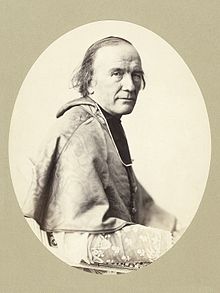Georges Darboy
This article relies largely or entirely on a single source. (January 2017) |
The Most Reverend Georges Darboy | |
|---|---|
| Archbishop of Paris | |
 Georges Darboy in 1865. | |
| See | Paris |
| Installed | January 1863 |
| Term ended | May 1871 |
| Predecessor | François-Nicholas-Madeleine Morlot |
| Successor | Joseph Hippolyte Guibert |
| Orders | |
| Ordination | 17 December 1836 |
| Consecration | 30 November 1859 |
| Personal details | |
| Born | 16 January 1813 Fayl-Billot, Haute-Marne, France |
| Died | 24 May 1871 (aged 58) Paris, France |
| Nationality | French |
| Coat of arms |  |
Georges Darboy (16 January 1813 – 24 May 1871) was a French Catholic priest, later bishop of Nancy then archbishop of Paris. He was among a group of prominent hostages executed as the Paris Commune of 1871 was about to be overthrown.
Biography
Darboy was born in Fayl-Billot, Haute-Marne in north-east France. He studied with distinction at the seminary at Langres, and was ordained priest in 1836. Transferred to Paris as almoner of the college of Henry IV, and honorary canon of Notre Dame, he became the close friend of Archbishop Affre and of his successor Archbishop Sibour. He was appointed bishop of Nancy in 1859, and in January 1863 was raised to the archbishopric of Paris. Darboy was a strenuous upholder of episcopal independence in the Gallican sense, and involved himself in a controversy with Rome by his endeavours to suppress the jurisdiction of the Jesuits and other religious orders within his diocese. Pope Pius IX refused him the cardinal's hat, and rebuked him for his liberalism in a letter which was probably not intended for publication.[1]
He is also known for his opposition in 1868 to Jacques-Paul Migne, forbidding him to continue his low-cost books business after the burning of his printing establishment, and suspending him from his priestly functions.[citation needed]
At the First Vatican Council he vigorously maintained the rights of the bishops, and strongly opposed the dogma of papal infallibility, against which he voted as inopportune. When the dogma had been finally adopted, however, he was one of the first to set the example of submission.[1]
Immediately after his return to Paris the war with Prussia broke out, and his conduct during the disastrous year that followed was marked by a devoted heroism which has secured for him an enduring fame. He was active in organizing relief for the wounded at the commencement of the war, remained bravely at his post during the siege, and refused to seek safety by flight during the brief triumph of the Paris Commune.[1]
On 4 April 1871, he was arrested by the communards as a hostage and confined in the prison at Mazas, from which he was transferred to La Roquette Prisons on the advance of the army of Versailles. On 24 May he was shot within the prison along with several other prominent hostages.[1] The execution was ordered by Théophile Ferré, who was himself executed by firing squad by the French government after the fall of the Commune.[citation needed]
Darboy died in the attitude of blessing and uttering words of forgiveness. His body was recovered with difficulty, and, having been embalmed, was buried with imposing ceremony at public expense on 7 June. He was the third archbishop of Paris to die violently between 1848 and 1871.[1]
Works
- Œuvres de Saint Denys l'Aréopagite (1845).
- Les Femmes de la Bible (1846–1849).
- Les Saintes Femmes (1850).
- Lettres à Combalot (1851).
- Jérusalem et la Terre Sainte (1852).
- L'Imitation de Jésus-Christ (1852).
- Statistique Religieuse du Diocèse de Paris (1856).
- Saint Thomas Becket (1858).
- Du Gouvernement de Soi-même (1867).
See also
References
This article needs additional citations for verification. (June 2012) |
- ^ a b c d e This article incorporates text from a publication now in the public domain: Chisholm, Hugh, ed. (1911). "Darboy, Georges". Encyclopædia Britannica. Vol. 7 (11th ed.). Cambridge University Press. p. 828. Endnote: See
- Joseph-Alfred Foulon (1889). Histoire de la Vie et des Œuvres de Mgr. Darboy. Paris: Librairie Poussielgue Frères.
- Guillermin, J. (1888). Vie de Mgr. Darboy. Paris: Bloud & Barral.
Further reading
- Horvath-Peterson, Sandra (1982). "Abbé Georges Darboy's 'Statistique Religieuse du Diocèse de Paris' (1856)," The Catholic Historical Review, Vol. 68, No. 3, pp. 401–450.
- Katz, Philip M. (1994). "'Lessons from Paris': The American Clergy Responds to the Paris Commune," Church History, Vol. 63, No. 3, pp. 393–406.
- Parsons, Reuben (1901). "The Clerical Victims of the Commune of 1871." In: Studies in Church History, Vol. VI. New York: Fr. Pustet & Co., pp. 85–110.
- Price, Lewis C. (1915). Archbishop Darboy and Some French Tragedies, 1813-1871. London: George Allen & Unwin.
- Vizetelly, Ernest Alfred (1914). My Adventures in the Commune, Paris, 1871. London: Chatto & Windus.
External links
- Use dmy dates from July 2013
- 1813 births
- 1871 deaths
- People from Langres
- Bishops of Nancy
- Archbishops of Paris
- Canons (priests)
- People of the Paris Commune
- 19th-century Roman Catholic archbishops
- Grand Officiers of the Légion d'honneur
- Executed French people
- French anti-communists
- Executed people from Champagne-Ardenne
